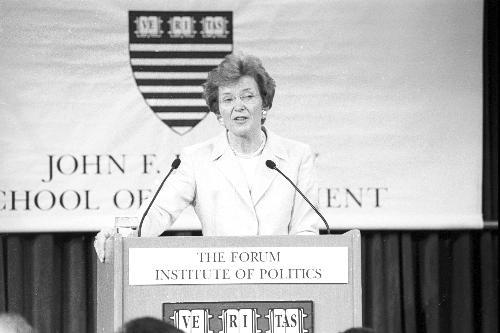
News
Summers Will Not Finish Semester of Teaching as Harvard Investigates Epstein Ties

News
Harvard College Students Report Favoring Divestment from Israel in HUA Survey

News
‘He Should Resign’: Harvard Undergrads Take Hard Line Against Summers Over Epstein Scandal

News
Harvard To Launch New Investigation Into Epstein’s Ties to Summers, Other University Affiliates

News
Harvard Students To Vote on Divestment From Israel in Inaugural HUA Election Survey
Human Rights Expert Says Teaching Is Key

The key to implementing human rights globally is through education, said a former U.N. High Commissioner for Human Rights at a Kennedy School of Government speech last night.
Mary Robinson, who received her J.D. from Harvard Law School in 1968, praised the University’s schools for collaborating on establishing human rights studies at Harvard.
She especially commended the Law School and the Kennedy School for their involvement and challenged the Business School to join in.
“Human rights is a business of everyone and the global society is recognizing the explicit respect for human rights,” Robinson said at the ARCO Forum, where about 300 students, professors and scholars were gathered.
She added that UN Secretary General Kofi Annan has been essential in helping integrate human rights fully into the UN, allowing it to better ensure that countries respect the rights of individuals.
Robinson touched often upon the Durban Conference against racism held last year in Durban, South Africa. The conference was both a “rewarding and frustrating experience,” she said, later condemning the anti-Semitism some conference delegates displayed that threatened to disrupt the conference.
Robinson also addressed the role of developed countries in supporting developing countries in their fight against poverty and in their efforts to promote democracy.
Developing countries must hold their leaders responsible for human rights violations, she said.
“Though globalization has seemed to bring common good to all, there’s a need to establish a legal framework that has potential for the development of democracy and removal of authoritarianism in the developing world,” she said.
Robinson said she will be involved in trying to bridge the gap between the developed and the developing countries, and that the New Economic Partnership for African Development is important to that effort.
She said African leaders, through that organization, are committed to effective governance, sound regulatory networks and respect for world standards.
President of Ireland from 1990 to 1997, Robinson was the first head of state to visit Rwanda in the aftermath of the genocide there—she has since made two further visits.
She was also the first head of state to visit the International Criminal Tribunal for the former Yugoslavia as well as the first head of state to visit Somalia following the 1992 crisis.
Robinson coined the phrase “cycle of impunity” to describe the process by which leaving mass murder unpunished encouraged others to do the same. She received the Special CARE Humanitarian Award in recognition of her efforts for Somalia.
Want to keep up with breaking news? Subscribe to our email newsletter.
